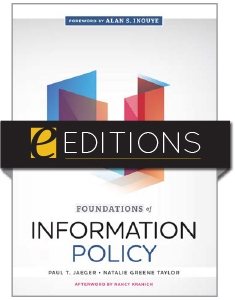
Primary tabs
You don't need to be an ALA Member to purchase from the ALA Store, but you'll be asked to create an online account/profile during checkout to proceed. This Web Account is for both Members and non-Members. Note that your ALA Member discount will be applied at the final step of the checkout process.
If you are Tax-Exempt, please verify that your account is currently set up as exempt before placing your order, as our new fulfillment center will need current documentation. Learn how to verify here.
- Description
- Table of Contents
- About the authors
- Reviews
This book is available in e-book format for libraries and individuals through aggregators and other distributors—ask your current vendor or contact us for more information.
Foreword by Alan S. Inouye; Afterword by Nancy Kranich
The first of its kind, this important new text provides a much-needed introduction to the myriad information policy issues that impact information professionals, information institutions, and the patrons and communities served by those institutions. In this key textbook for LIS students and reference text for practitioners, noted scholars Jaeger and Taylor
- draw from current, authoritative sources to familiarize readers with the history of information policy;
- discuss the broader societal issues shaped by policy, including access to infrastructure, digital literacy and inclusion, accessibility, and security;
- elucidate the specific laws, regulations, and policies that impact information, including net neutrality, filtering, privacy, openness, and much more;
- use case studies from a range of institutions to examine the issues, bolstered by discussion questions that encourage readers to delve more deeply;
- explore the intersections of information policy with human rights, civil rights, and professional ethics; and
- prepare readers to turn their growing understanding of information policy into action, through activism, advocacy, and education.
This book will help future and current information professionals better understand the impacts of information policy on their activities, improving their ability to serve as effective advocates on behalf of their institutions, patrons, and communities.
Acknowledgments
Table of Acronyms
Foreword by Alan S. Inouye
Chapter 1 Searching for Information (Policy)
Chapter 2 What Is Information Policy?
Chapter 3 Sources of Information Policy
Chapter 4 Why Study Information Policy?
Chapter 5 The Development of Information Policy
Chapter 6 Types of Laws, Policies, and Regulations Impacting Information: Access, Infrastructure, and Management
Chapter 7 Types of Laws, Policies, and Regulations Impacting Information: Access, Rights, and Responsibilities
Chapter 8 Information Policy, Information Professions, and Information Institutions
Chapter 9 The Broader Context of Information Policy
Chapter 10 Advocacy and Activism in the Information Professions
Chapter 11 The Future of Information Policy
Afterword: Adventures in Information Policy Wonderland, by Nancy Kranich
References
About the Authors
Index
Paul T. Jaeger
Paul T. Jaeger, PhD, JD, MEd, MLS, is a professor and Distinguished Scholar-Teacher in the College of Information Studies, director of the Museum Scholarship and Material Culture certificate program, and associate director of the Maryland Initiative for Digital Accessibility at the University of Maryland. He studies the impacts of law and policy on information access and behavior as issues of human rights and civil rights. He is the author of more than two hundred journal articles and book chapters; Foundations of Information Law is his twentieth book. His research has been funded by the Institute for Museum and Library Services, the American Library Association, the Bill and Melinda Gates Foundation, the Smithsonian Institution, and the National Science Foundation, among others. He is an editor of Library Quarterly and an executive editor of Including Disability. He is cofounder and cochair of the Including Disability Global Summit. He has also previously served as an editor for Advances in Librarianship, Government Information Quarterly, the International Journal of Information, Diversity, and Inclusion, and the Information Policy Book Series from MIT Press, but not at the same time. In 2014 he received the Library Journal/ALISE Excellence in Teaching Award. A 2019 study published in Public Library Quarterly named him one of the two most influential scholars of public library research in the past thirty-five years (it was a tie), and a 2020 study published in Library Quarterly found his publications to have the highest prestige value in the field.
Natalie Greene Taylor
Natalie Greene Taylor, PhD, MLIS, is an associate professor at the University of South Florida’s School of Information and serves as the coordinator for the Master of Library and Information Science program. Her research focuses on the intersection of information access, information literacy, and information policy. Dr. Taylor serves as an editor of Library Quarterly and has published articles in School Library Research, Journal of Information Science, Computers & Education, and Journal of Documentation, among others. She has coauthored five books, including Foundations of Information Literacy; Foundations of Information Policy; Digital Literacy and Digital Inclusion: Information Policy and the Public Library; and Libraries, Human Rights and Social Justice: Enabling Access and Promoting Inclusion. She has edited two books: Libraries and the Global Retreat of Democracy and Perspectives on Libraries as Institutions of Human Rights and Social Justice.
"The most comprehensive consideration of laws, policies, and regulations targeted for library professionals to date. This unique text is certainly required reading for all library school students and an essential handbook for all librarians."
— Catholic Library World
"Includes a list of frequently used acronyms, an index, and separate endnotes, and 'questions to consider' after each chapter aim to make the text user-friendly. The posed questions not only serve as reviews of each chapter, but can also alert readers to important points to look for if consulted prior to reading the chapters ... While directed primarily at information specialists (i.e., librarians), this work is undoubtedly appropriate as well for archivists, making it an important entry into the ongoing discussions of best practices and policies for knowledge managers."
— Archival Issues
"Rich in reflections on the roles and duties of information professionals in ensuring democratic order of information, human rights and equality of all information users."
— Information Research


